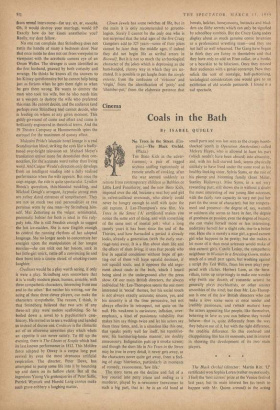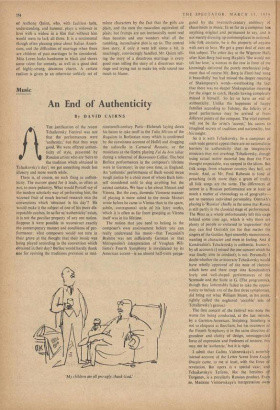Cinema
Coals in the Bath
By ISABEL QUIGLY No Trees in the Street. (Em- pire.)—The Black Orchid. (Plaza.) THE Bisto Kids in the adver- tisement, a pair of ragged urchins sniffing rapturously at remote smells of cooking, after the war seemed suddenly as remote from contemporary children as Bubbles or Little Lord Fauntleroy, and the new Bisto Kids, imposed over the old, became a neat boy and girl in velvet-collared overcoats, who clearly could never be hungry enough to sniff with quite the old rapture. J. Lee-Thompson's new film, No Trees in the Street ('A' certificate) makes you notice the same sort of thing, and with something of the same sort of mental jolt: what a long twenty years it has been since the end of the Thirties, and how barnacled a period it already looks, already a generation (with the early mar- riage-rate) away. It is a film about slum life and the effects of slum living; it says that people who live in squalid conditions without hope of get- ting out of them will have squalid destinies, if not squalid souls; and it opposes the old argu- ment about coals in: the bath, which I heard being aired in the underground after the press show. Of our main British directors, the always individual Mr. Lee-Thompson seems the one most interested in 'social' themes, but his social touch is not always exactly accurate; sincere, yes, and his sincerity is at the time persuasive, but not always effective in retrospect, not quite on the nail. His weakness is caricature, inflation, over- emphasis, a kind of passionate volubility that makes him say things twice and let his actors say them three times, and, in a situation like this one, that speaks pretty well for itself, his repetitive- ness, his hammering-home manner, are doubly unnecessary. Indignation puts up a smoke screen; and though the slum life in No Trees in the Street may be true in every detail, it never gets away, as the characters never quite get away, from a feel- ing of stagy histrionics, particularly in moments of comedy, raucousness, 'low life.'
The story turns on the decline and fall of a boy coaxed into petty crime and ending as a murderer, played by a.newcomer (newcomer to such. a big part, that is : he is an old hand at small parts and was last seen as the creepy bomb- shocked youth in Operation Amsterdam) called Melvyn Hayes, who is allowed to ham, his part (which needn't have been absurd) into absurdity, and, with his half-starved look, seems physically unlikely to have lived under the same roof as his healthy-looking sister, Sylvia Syms, or the rest of his plump and blooming family (Joan Miller, Stanley Holloway). Miss Syms, in a not very rewarding part, still shows she is without a doubt the most interesting of our young film actresses, with the fairly rare capacity to vary not just her part (in the sense of character), but her tempera- ment and presence—the degree of, say, warmth or coldness she seems to have in her, the degree of goodness or passion, even the degree of beauty; she, can make herself more or less interesting, underplay herself for a slight role, rise to a better one. Here she is merely a nice girl, a good earnest girl who happens to be pretty; but she makes a lot more of it than most actresses would make of nice earnest girls. Carole Lesley, the sympathetic neighbour in Woman in a Dressing Gown, makes much of a small part again, but working against a script (by Ted Willis, from his own play) pep- pered with cliches. Herbert Lom, as the hero- villain, turns up surprisingly to make one wonder why (with our dearth of romantic actors) he generally plays psychiatrists, or other sinister smoothies of the kind; but then Mr. Lee-Thomp- son is one of the few British directors who can make a love scene seem at once tender and Credibly passionate, and (which matters) keep the actors appearing like people, like themselves, behaving in love as you can believe they would behave—that is, quite differently from the way they behave out of it, but with the right difference, the credible difference. So this 'confused and disappointing film has its moments, and its interest in showing the development of its two main players.
The Black Orchid (director : Martin Ritt: certificate) won Sophia Loren (rather mysteriously. I feel) the 'best actress' prize at the Venice festival last year; but its main interest lies (as tends to happen with Mr. Quinn around) in the acting of Anthony Quinn, who, with faultless taste, understanding, and humour, plays a widower in love with a widow in a film that without him would seem to lack all three. It is a sentimental though often pleasing piece about Italian Ameri- cans, and the difficulties of marriage when there are children of past marriages to be considered. Miss Loren looks handsome in black and shows some talent for comedy, as well as a good deal of highly-strung, decorous charm. A certain realism is given to an otherwise unlikely set of minor characters by the fact that the girls are plain, and the men the masculine equivalent of plain; but frumps are not intrinsically more real than beauties and one wonders what all the rambling, inconclusive plot is up to. The central Jove story, if only it were left alone a bit, is touchingly, convincingly handled. Mr. Quinn tell- ing the story of a disastrous marriage is every good man telling the story of a disastrous mar- riage and trying not to make his wife sound too much to blame.



















































 Previous page
Previous page